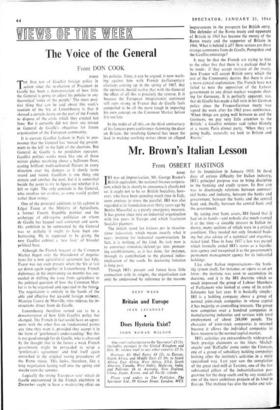The Voice of the General
From DON COOK
PARIS HE first test of Gaullist foreign policy in I action since the re-election of President de Gaulle has been a demonstration of how little the General is going to adjust his policies to any theoretical 'voice of the people.' The most posi- tive thing that can be said about this week's reunion of the Six at Luxembourg is that it showed a certain desire on the part of the French to dispose of the crisis which they created last June. But it certainly did not show any retreat in General de Gaulle's objectives for future organisation of the European community.
It is current Gaullist fashion in Park to pro- nounce that the General has 'moved the govern- ment to the left' in the light of the elections. But General de Gaulle is no pendulum operator. Gaullist politics works more like one of those mirror globes revolving above a ballroom floor, casting brilliant multi-coloured flickers in every direction over the dancers as it slowly turns round and round. Gaullism is one thing one minute and another the next, but it is somewhat beside the point to try to figure out whether it is left or right. The only constant is the General, who revolves (or evolves, as some would prefer) rather than swings.
. One of the principal additions to his cabinet is Edgar Faure at the Ministry of Agriculture, a former Fourth Republic premier and the archetype of old-regime politician on whom de Gaulle has heaped such contempt and scorn. His ambition to be summoned by the General was so pathetic it ought to have been em- barrassing. He is supposed to be giving the new Gaullist cabinet a 'new look' of broader political base.
Although the French boycott of the Common Market began over the breakdown of negotia- tions for a new agricultural agreement last July, Faure was not even present when the Six at last sat down again together in Luxembourg. French diplomacy in the intervening six months has suc- ceeded in shifting the issue from agriculture to the political question df how the Common Mar- ket is to be organised and operated in the futurffl. The negotiation is entirely in the hands of the able and effective but ice-cold foreign minister, Maurice Couve de Murville, who redeives_ his in- structions direct from de Gaulle.
Luxembourg therefore turned out to be a demonstration of how little Gaullist policy has changed. The French in fact could have an agree- ment with the other five on fundamental points any time they want it, provided they accept it in the form of 'gentleman's understanding.' But this is not good enough for de Gaulle, who is obsessed by the thought that in the future a weak French government might be persuaded to scrap a 'gentleman's agreement' and find itself again enmeshed in the original voting procedures of the Rome treaty. This looks, therefore, like a long negotiation lasting well into the spring and maybe even the summer.
Logically the strong 'European vote' which de Gaulle encountered in the French electorate in December ought to have a moderating effect on
his policies. Time, it can be argued, is now work- ing against him with French parliamentary elections coming up in the spring of 1967. But the optimists should realise that with the General the effect of all this is precisely the reverse. It is because the European integrationist sentiment still runs strong in France that de Gaulle feels compelled to be all the more tough in imposing his own concept on the Common Market before it is too late.
In the midst of all this, on the third anniversary of his famous press conference slamming the door on Britain, the revolving General has taken the lead in making soothing noises about an alleged improvement in the prospects for British entry. The defender of the Rome treaty and opponent of Britain in 1963 has become the enemy of the Rome treaty and the supporter of Britain in 1966. What is behind it all? How serious are these strange comments from de Gaulle, Pompidou and the Gaullist entourage?
It may be that the French are trying to hint to the other five that there is a package deal to be made: if they accept revision of the treaty, then France will accept British entry which the rest of the Community desires. But there is also a more cynical explanation. The French have not failed to note the opposition of the Labour government to any direct nuclear weapons shar- ing for Germany. It is perfectly apparent, too, that de Gaulle has made a full turn in his German policy since the Franco-German treaty was signed the week after his 1963 press conference. 'When things are going well between us and the Germans, we pay very little attention to the British,' a Gaullist minister said rather blandly at a recent Paris dinner party. 'When they are going badly, naturally we look to Britain and Russia.'


































 Previous page
Previous page